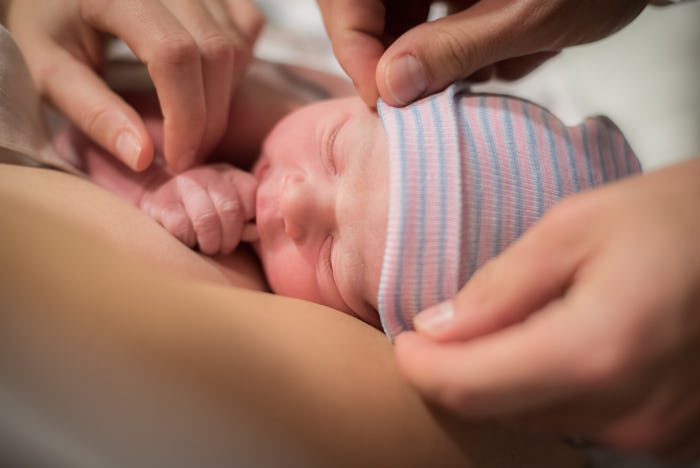Life

Here's When To Schedule Your Baby's First Checkup, According To A Pediatrician
After the flurry of childbirth, it was a relief to return home with my baby in my arms — or little 6-pound football, as my partner described her. But it was also a shock. After all, how exactly was I qualified to mother this tiny, fragile football? Didn't I need a license? Certification? Anything? We were seeing our pediatrician in three days, my partner reminded me. Surely we could keep the baby alive until then? (Spoiler alert: she's totally fine.) If you're wondering, when should you schedule your baby's first checkup, don't worry. It seems overwhelming, but your hospital or clinic will discharge you with clear instructions.
That first newborn visit is one of the most important, according to Jarret Patton, MD, FAAP, of Reading, Pennsylvania, and the checkup is typically scheduled within one-to-three days of your discharge from the hospital. Because a lot can change even in that short window, pediatricians always want to see you sooner rather than later. As Patton explains:
"Some of the things we’re concerned with is if the baby is feeding well, urinating well, stooling well, and we also want to look out for any signs of jaundice, which is a yellowing of the skin and eyes some babies develop after the first days of life."
Whether you visit your pediatrician the very next day or a few days later depends on practitioner guidelines and the results of your baby's newborn screening. While some parents might be less than thrilled to see a doctor again so soon, it's important to keep the recommended appointment, even if your baby seems perfectly healthy to you.
One reason babies see the doctor so soon after discharge? Jaundice and its symptoms can be sneaky, according to Mayo Clinic, and many babies can only be diagnosed with the condition in the days after your relatively short stay at the hospital.
"After one or even two days in the hospital, we don’t have enough time to determine if the child is going to have a problem," notes Patton. "They typically have their highest level of bilirubin between days three and four of age. So that’s usually when we’ll be seeing them in the office, and that’s why we’ll often get a blood test done at that visit."
Severe signs of jaundice warrant a call to your doctor right away, and may result in an earlier-than-scheduled first checkup. Mayo Clinic recommended looking out for quickly yellowing skin; yellow abdomen, arms or legs; yellow whites of the eyes; high-pitched crying; poor feeding; and listless behavior. Additionally, if your baby is difficult to wake, call your doctor immediately.
Personally, I was thrilled with my baby's first checkup. I felt like I'd been tossed into the deep end of motherhood before learning how to swim. So when our doctor said we were doing a good job, it was like winning the Nobel Prize. (As befitting such an honor, I glowed and gloated, obnoxiously, for days.) I also felt a whole lot better — like maybe I could figure out this whole mom thing after all.
“If nothing else, that first visit is great just for the reassurance, because in the hospital you have nurses and aides and doctors and residents and all types of people hovering over you and your baby . . . But after you get out, there’s nobody," says Patton. "At the doctor’s, you get a chance to ask all those questions you forgot to ask when you were still in the hospital. So don’t forget to bring your list of questions to the visit."
Three days after I left the building where my baby made her grand entrance, I definitely had a list. It was 30 questions long, and my pediatrician deserves a peace prize for patiently listening to, and answering, every last one.